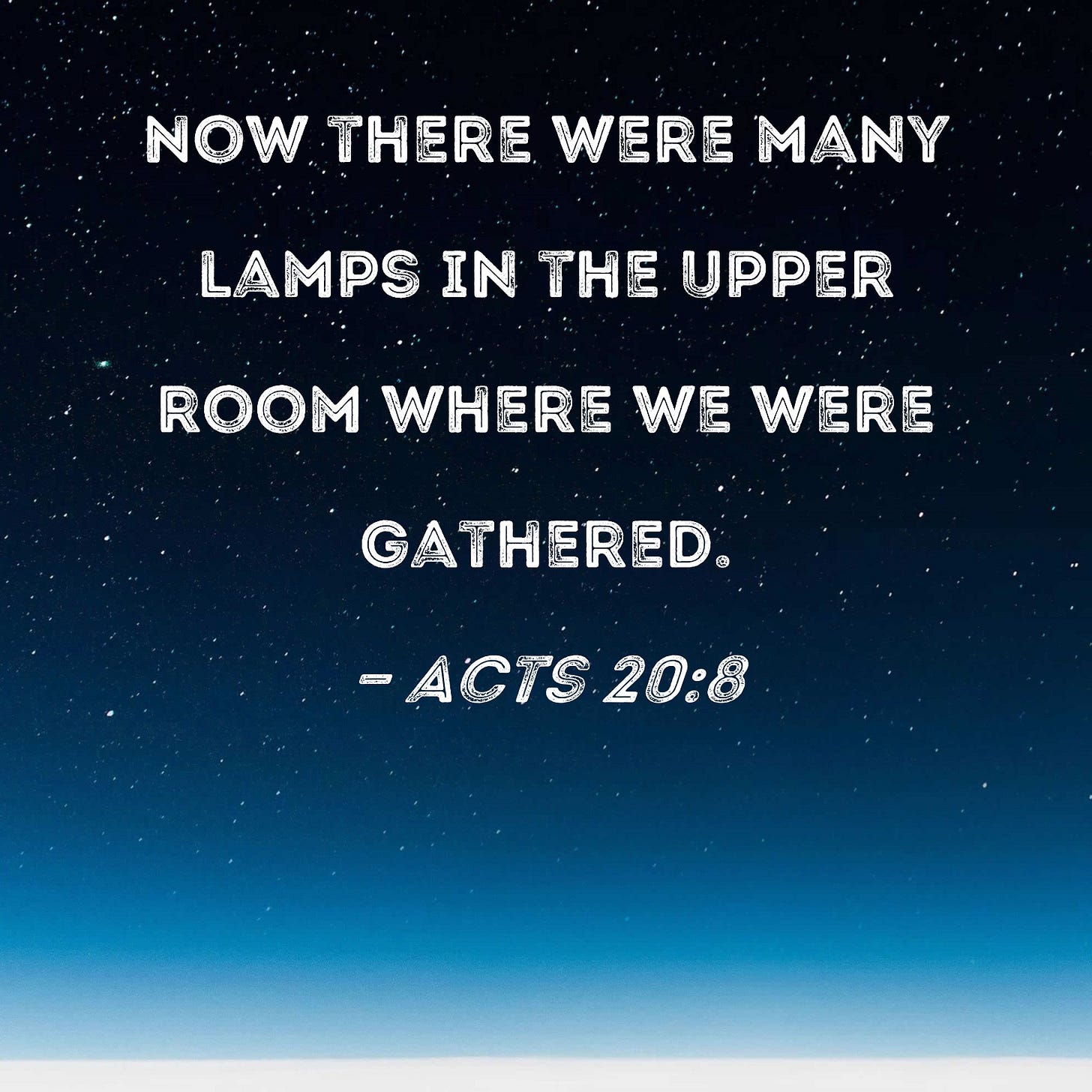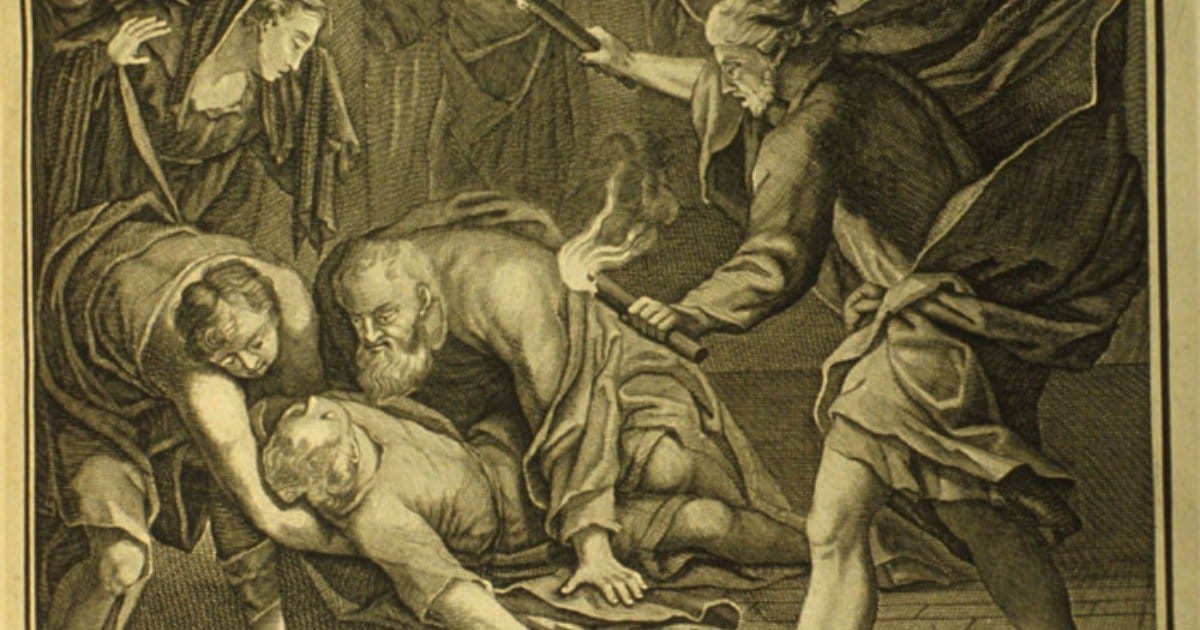A Study of Acts: Eutychus Drops Out of Paul’s Class
Acts 20:7-12; 1 Kings 17:17-24; 2 Kings 4:32-37 - What is important to Paul and Luke is the Word of God; miracles are nice, but they are not what drives or sustains our faith.
“On the first day of the week, when we were gathered together to break bread, Paul began talking to them, intending to leave the next day, and he prolonged his message until midnight. There were many lamps in the upper room where we were gathered together. And there was a young man named Eutychus sitting on the window sill, sinking into a deep sleep; and as Paul kept on talking, he was overcome by sleep and fell down from the third floor and was picked up dead. But Paul went down and fell upon him, and after embracing him, he said, “Do not be troubled, for his life is in him.” When he had gone back up and had broken the bread and eaten, he talked with them a long while until daybreak, and then left. They took away the boy alive, and were greatly comforted.”
Acts 20:7-12 NASB1995
I have a confession to make: Although the temporary outcome for the young man named Eutychus was horrible, I find this miracle story to be quite amusing in many ways. We have all struggled with long sermons, interminable lectures and boring shows (television, movies and theater) and can easily succumb to deep sleep, especially if the room is warm and we are comfortable. In this case, the room was also quite smoky because of the many lanterns, which can irritate the eyes and make one even more drowsy. By the way, the name Eutychus means “fortunate”, according to the lexicon in the Blue Letter Bible.
It has to be comforting to pastors and Bible teachers to know that even Paul, a giant of the faith and a man who certainly knows how to use words (perhaps not as well as Apollos), can drag things on long enough that some sink into a deep sleep. I can almost guarantee that Eutychus was not the only nodding head in that room at that late hour, but the others were not precariously perched on a windowsill. When Eutychus fell, that led to many startled disciples, including Paul, and probably woke up many others. This story from Bob Deffinbaugh quoted on Precept Austin is quite good:
When I was in Jr. High School, we had a fellow fall asleep in our class. As I remember, the teacher decided to teach the student a lesson by having the class silently slip out at the end of the period. The next class was also instructed to slip into their seats quietly. The student slept peacefully on—until about half way through the next period. Everyone was waiting and watching for him to wake up, which he did, of course. He opened his eyes, looked around the class, and came to the realization that it was another class, and not his own. He quietly gathered up his books and left class, as inconspicuously as possible. Sleeping in class has happened for centuries.
In our text, we are told of a young man named Eutychus, who fell asleep during Paul’s lengthy sermon, and then fell three stories down to his death. As you know, this young man was raised to life, and so the story is a happy one in the end. I am inclined to entitle the section which describes the death and raising of Eutychus, “Eutychus Drops Out of Paul’s Class.” It is indeed and interesting story, and in time I believe we will see why the story was included in Luke’s account.
It would be an amusing exercise to swap “falling asleep in church” stories this morning. I only wish that there was time. Over the years I have seen a few of you fall asleep. I am frankly tempted to use this account as a proof text for lengthy sermons. A. T. Robertson makes this comment about Paul’s extended sermon: “Paul’s purpose to leave early next morning seemed to justify the long discourse. Preachers usually have some excuse for the long sermon which is not always clear to the exhausted audience.” But I am afraid that if I did preach any longer you would insist that I would have to be able to raise the dead, like Paul, or at least promise to leave the following day.
Paul and the Disciples Attend to Eutychus - Artist Unknown
The group was gathered on the third floor of the building and it appeared that Eutychus died in the fall, as the passage says that he was picked up dead. Luke, the physician, concurs with this as he reports it as fact. But Paul fell upon the young man and embraced him and told the group to not be troubled, because Eutychus’ life was in him again. The miracle is reminiscent of the miracles performed by Elijah and Elisha:
“Now it came about after these things that the son of the woman, the mistress of the house, became sick; and his sickness was so severe that there was no breath left in him. So she said to Elijah, “What do I have to do with you, O man of God? You have come to me to bring my iniquity to remembrance and to put my son to death!” He said to her, “Give me your son.” Then he took him from her bosom and carried him up to the upper room where he was living, and laid him on his own bed. He called to the Lord and said, “O Lord my God, have You also brought calamity to the widow with whom I am staying, by causing her son to die?” Then he stretched himself upon the child three times, and called to the Lord and said, “O Lord my God, I pray You, let this child’s life return to him.” The Lord heard the voice of Elijah, and the life of the child returned to him and he revived. Elijah took the child and brought him down from the upper room into the house and gave him to his mother; and Elijah said, “See, your son is alive.” Then the woman said to Elijah, “Now I know that you are a man of God and that the word of the Lord in your mouth is truth.””
1 Kings 17:17-24 NASB1995
“When Elisha came into the house, behold the lad was dead and laid on his bed. So he entered and shut the door behind them both and prayed to the Lord. And he went up and lay on the child, and put his mouth on his mouth and his eyes on his eyes and his hands on his hands, and he stretched himself on him; and the flesh of the child became warm. Then he returned and walked in the house once back and forth, and went up and stretched himself on him; and the lad sneezed seven times and the lad opened his eyes. He called Gehazi and said, “Call this Shunammite.” So he called her. And when she came in to him, he said, “Take up your son.” Then she went in and fell at his feet and bowed herself to the ground, and she took up her son and went out.”
2 Kings 4:32-37 NASB1995

So although the miracle is noted by Luke, it seems like it is just a passing moment, as Paul returns almost immediately to the room. The group breaks bread and he continues to speak to the group until daybreak (and he was planning a long walk that very day). After he left, the young man was there to be taken home alive, and all were greatly comforted. I thought this commentary, again by Bob Deffinbaugh quoted in Precept Austin, is crucial to understanding what is really important in our faith:
Why is so little emphasis put on this miracle? Why is it passed over so quickly? Because this was not Paul’s priority. Paul is instrumental in the raising of the lad, but it was not his main interest. Paul was intent on teaching these folks, so much so that when the boy was raised to life, he quickly went back upstairs to observe communion and to teach more, for the rest of the night (verse 11). It is almost as though Paul looked at his watch and said, “Oh my, we have just lost 20 minutes of teaching time, let’s quickly go upstairs and break bread and then I have some more things which I need to teach you before I leave.” Why do both Paul and Luke give this miracle “second place” status? Many seem to think that Acts is a book of miracles, and that this book is our basis for assuming that God not only can but will work miracles on a daily basis.
When one reads the Book of Acts carefully, you find that the book records fewer miracles than we might expect—fewer miracles than actually occurred. I believe that both Luke and Paul were firmly convinced that while miracles would come and go, but that the Word of God would be eternal. I believe that both were convinced that while miracles will not sustain faith, the Word of God will. This is why Paul and Luke deal briefly with the miracle and deal emphatically with the teaching. Faith is not based upon what is seen (miracles, for example), but on the Word of God (see Hebrews 11). Thus miracles will not sustain our faith, but the Word of God will. And thus we see the sense of urgency of Paul with regard to the need to teach these saints.
Shortly after they began to meet (it would seem) Paul began speaking to them, knowing that his departure was on the following day. He knew he had only a little time, but much to say (see verse 7). Because of the shortness of his time with them, Paul extended his teaching until midnight (verse 7). It was because of Paul’s lengthy teaching and because of the many lamps in that room that Eutychus fell asleep and from the window to his death (verses 8-9). When Eutychus was raised to life, Paul went back upstairs, eager to continue on with his teaching, throughout the night.
The next time you go to church and the message seems long-winded or you find yourself not paying attention to a Bible class teacher, think of Eutychus and pray that you can wake up and pay attention to what is of utmost importance: The Word of God.
My next devotional examines Acts 20:13-16 - Paul walks from Troas and meets the group again in Assos and they continue to sail to Miletus.
Heaven on Wheels Daily Prayer:
Dear Lord - I thank you for the men of the Word like Paul, who could perform miracles, but was more concerned about the Word of God. Help me to be alert to the Word when I hear it! Amen.
Scripture quotations taken from the (NASB®) New American Standard Bible®, Copyright © 1960, 1971, 1977, 1995 by The Lockman Foundation. Used by permission. All rights reserved. lockman.org
Precept Austin was accessed on 12/29/2024 to review commentary for Acts 20:7-12.




